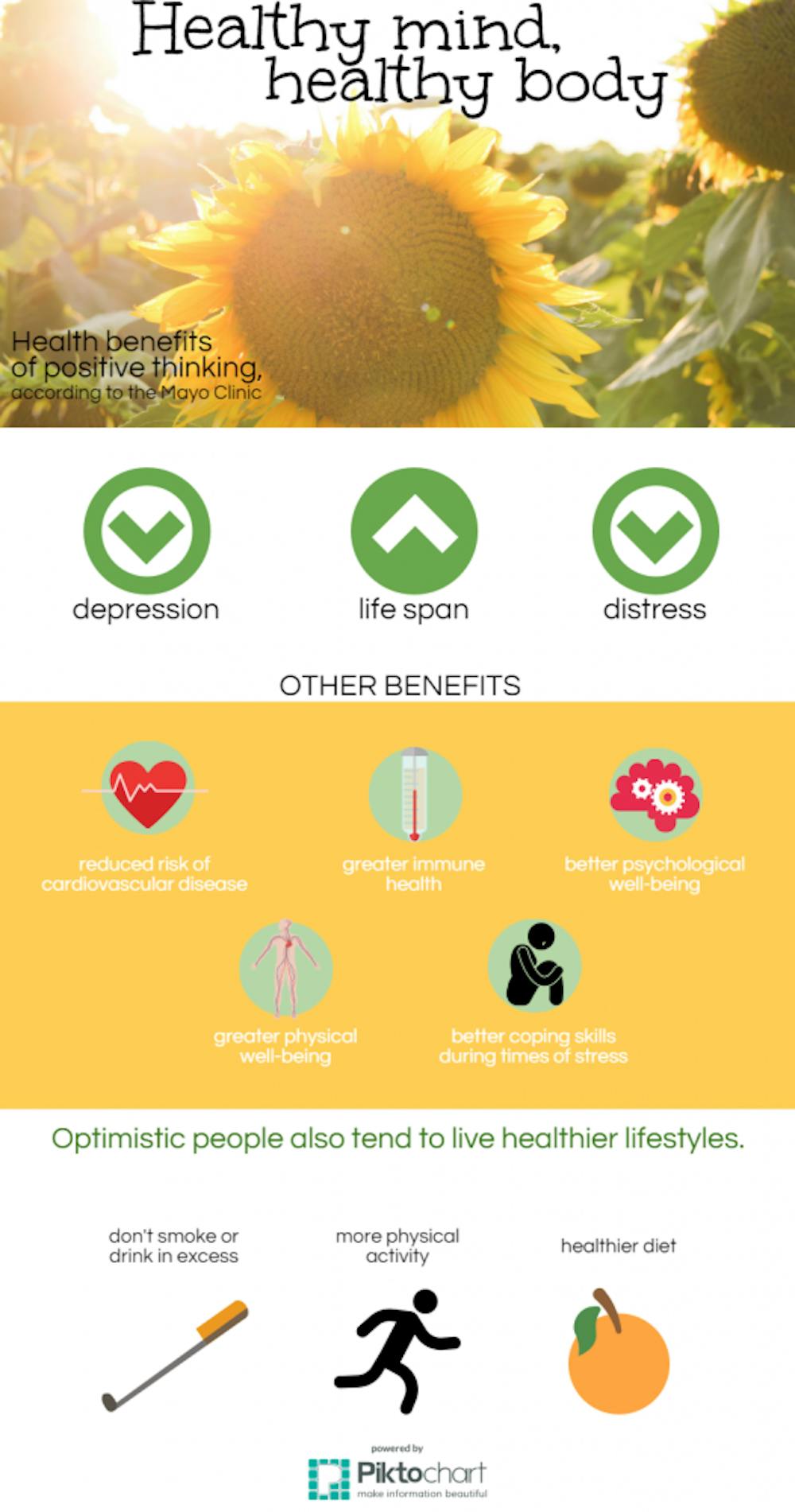Remember the days when life was simple: no obligations, commitments, drama or hardships? Back in elementary school, or even prior to that, the only thing to get upset about was not getting what one wanted, and I’m talking about a candy bar or a new toy. By the time college came around, things changed: half of the conscious is constantly stressing about future deadlines while the other is either nostalgic or regretful about the past. Regardless, the present is lost and so is one’s positivity.
As finals quickly approach, it’s easy to become consumed by negative thoughts and stress, ultimately leading to failure and all the other things that are results of stress — acne, sleep deprivation, etc. — further enhancing that unwanted negativity. Fortunately, all this can be easily avoided with one simple solution: optimism.
It may seem unrealistic that thinking positively will have positive results, but once experienced, it becomes addicting. Similar to the domino effect, thinking positively about the future changes the outcome of the situation, encouraging people to continue those positive thoughts. It’s important to note that optimism does not lead to getting everything you want but, rather, finding the good in bad situations.
The best way to remain optimistic in bad situations is to think “everything happens for a reason.” While it’s cliche, it makes it easier to understand why things happen the way they do and is a good reminder that everything will work itself out.
Optimistic thoughts are not the only thing necessary to living an optimistic life. The Positivity Blog, in the article “How to Stay Positive: 11 Smart Habits,” suggests a few other ways to remain positive when life seems unfair. Thinking positively is only the first — but with emphasis on starting the day positively by starting slowly and steering clear of things that bring negative thoughts, like listening to or watching the news.
The article can be summarized into three essential points: go slowly, be vulnerable and spread positivity.
The most surprising advice I took from the article was that speeding through everyday routines causes stress. Due to time commitments and future plans, everything becomes rushed. Without notice, eating, walking and to-do lists are all sped up, causing that stressful feeling of being late. This is the result of not being mindful, or in the present, a problem society in the United States faces as a whole despite how easy it is to avoid.
Slow down. By eating slower, walking slower and completing tasks slower, the mind is able to focus on what is going on currently, decreasing the unnecessary stress that the future is so infamous for bringing up.
Sociologist George Ritzer coined the term “McDonaldization” to describe the American society as one that breaks down every human task until it is at its most efficient stage, just as fast food industries do. This explains why caffeine and some illegal drugs are as hyped in America as they are; the idea that coffee, soda, cocaine or ADHD medications will increase productivity makes them appealing to Americans. It also explains why Americans feel the need to rush education. Rather than racing one’s own abilities to complete college in four or less years is viewed as obscene in other countries.
Another tip that I first viewed as questionable was the advice to make oneself vulnerable. The word “vulnerable” is often times associated with sensitivity and lack of control in a situation, but vulnerability actually has a very positive result. By being vulnerable, the only thing one lack’s is the fear of rejection, something that both stimulates negative thoughts and is stimulated by negative thoughts. The fear of rejection holds people back, but thinking positively about the possible outcomes could ultimately result in no rejection. And if it doesn’t work out, just think back to the cliche that “everything happens for a reason” and turn to the mindset that something better will come in the future.
If you still think the cliche doesn’t provide enough reassurance, just think back to the times in life when things didn’t work out as preferred: dissolved relationships, missed or denied opportunities, etc. Then look at where you are now and ask yourself, “Where would I be right now if those things would have worked out for me?”
The last essential piece of advice may not come as a surprise, but is one of the most important: even before reaping the benefits of one’s own positivity, share the love! Spread positivity through compliments, uplifting advice or just doing something unexpectedly nice for someone (like holding the door or buying their drink). The favor will be returned--maybe not by them, but it will.
The great thing about using positivity to get out of life’s ruts is that there is nothing to lose; It’s a free solution to a terrible problem.




